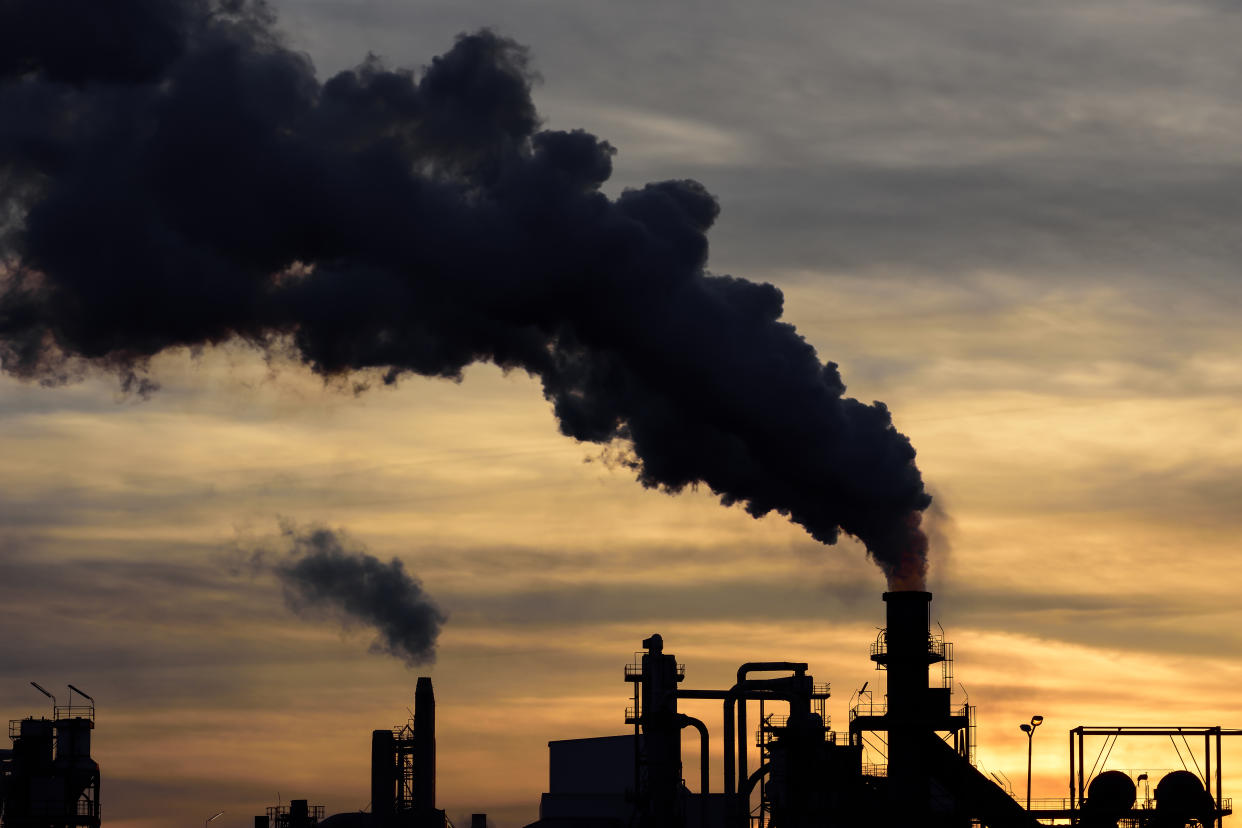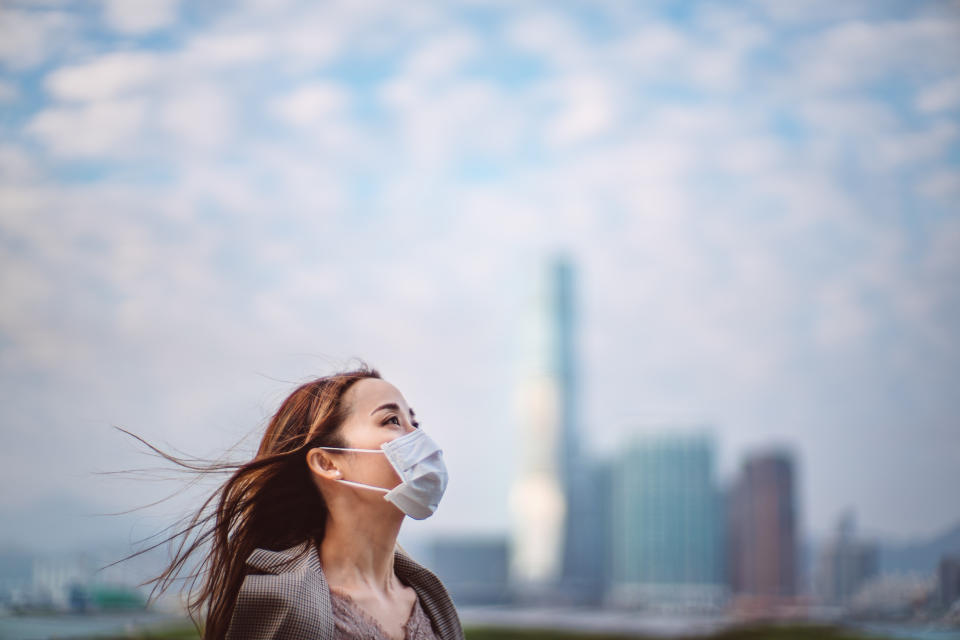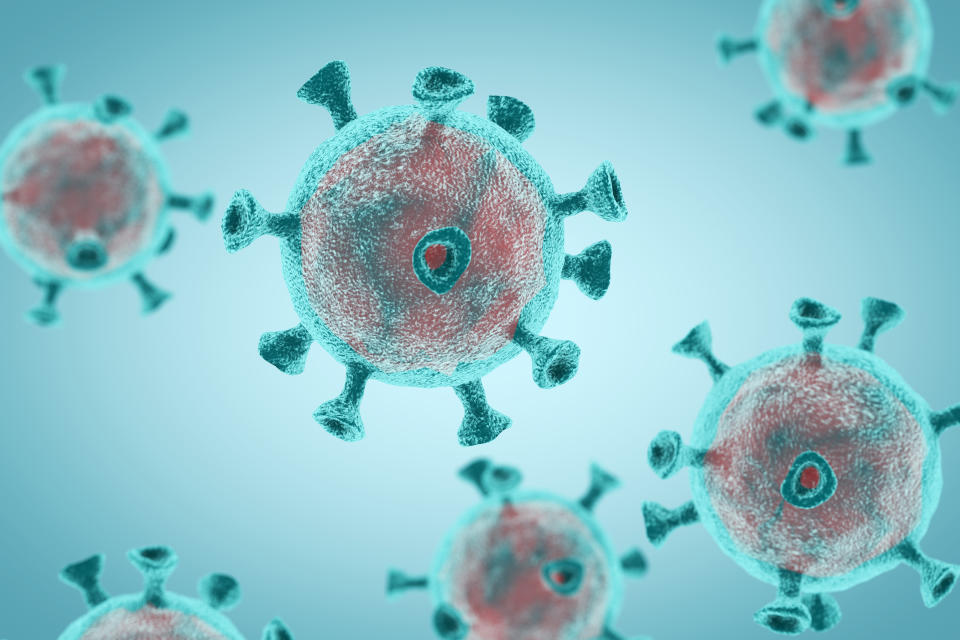14% of all UK coronavirus deaths linked to air pollution, study finds

Long-term exposure to air pollution may have contributed towards 15% of coronavirus deaths worldwide, research suggests.
Since the outbreak was identified at the end of 2019, the confirmed global death toll has exceeded 1.1 million.
Early in the pandemic, experts warned people with pre-existing heart and lung disorders may be at greater risk of complications if they catch the infection.
With air pollution known to make these conditions more life-threatening, scientists from the Max Planck Institute for Chemistry in Germany analysed exposure to vehicle emissions via global satellites.
Read more: Harvard doctor describes mourning a loved one amid the pandemic
When linked to coronavirus death data, the scientists estimated air pollution contributed to more than a quarter (27%) of COVID fatalities in East Asia, 19% in Europe and 17% in North America up to June.
The UK coronavirus death toll is approaching 45,000, with more than one in 10 (14%) being linked to air pollution, the results suggest.

“When people inhale polluted air, the very small polluting particles migrate from the lungs to the blood and blood vessels, causing inflammation and severe oxidative stress, which is an imbalance between free radicals and oxidants in the body that normally repair damage to cells,” said study author Professor Thomas Münzel from Johannes Gutenberg University in Mainz.
“This causes damage to the inner lining of arteries, and leads to the narrowing and stiffening of the arteries.
“The COVID-19 virus also enters the body via the lungs, causing similar damage to blood vessels.
Read more: How to breastfeed safely during the pandemic
“If both long-term exposure to air pollution and infection with the COVID-19 virus come together then we have an additive adverse effect on health, particularly with respect to the heart and blood vessels, which leads to greater vulnerability and less resilience to COVID-19 [the disease caused by the coronavirus].
“If you already have heart disease, then air pollution and coronavirus infection will cause trouble that can lead to heart attacks, heart failure and stroke.”
Watch: Can you catch coronavirus twice?
Coronavirus aside, exposure to fine particulate matter (PM) is responsible for more deaths than any infection, the scientists wrote in the journal Cardiovascular Research.
PM gets released from vehicle emissions and floats unseen in the atmosphere.
When smaller than 2.5μm (PM2.5), 400th of a millimetre, the particles are known to get “lodged” in the lungs.
Read more: What makes COVID-19 so dangerous for some?
Similar factors heighten a person’s risk of dying from both coronavirus complications and air pollution exposure. These include old age, being male and pre-existing conditions like obesity, diabetes and asthma.
The circulating coronavirus is thought to be more than 80% genetically similar to severe acute respiratory syndrome (Sars), which killed 884 people during its 2002/3 outbreak.
One study found that in parts of China with moderate levels of air pollution, the risk of dying with Sars was more than 80% higher than in areas with relatively clean air, while in heavily polluted regions the risk of death doubled.
To better understand how air pollution may affect a coronavirus patient’s death risk, the scientists estimated PM exposure based on global satellite data.
This was then compared against previous studies by US, Chinese and Italian researchers on how air pollution was linked to Sars and COVID-19.
Results suggest that, up to June 2020, air pollution had contributed to around 15% of coronavirus-related deaths worldwide.
Perhaps surprisingly, the Czech Republic was found to be the worst affected, with the Max Planck scientists attributing air pollution to 29% of its coronavirus deaths.
This was followed by China (27%), Germany (26%) and Switzerland (22%).
Of the 15% of global fatalities that were linked to air pollution, between 50% and 60% were traced to fossil fuel use, rising to between 70% and 80% in Europe, West Asia and North America.
The scientists called these death proportions “the fraction of COVID-19 deaths that could be avoided if the population were exposed to lower counterfactual air pollution levels without fossil fuel-related and other anthropogenic [caused by humans] emissions”.
Co-author Professor Jos Lelieveld from the Max Planck Institute added: “Since the numbers of deaths from COVID-19 are increasing all the time, it’s not possible to give exact or final numbers of COVID-19 deaths per country that can be attributed to air pollution.
“However, as an example, in the UK there have been over 44,000 coronavirus deaths and we estimate the fraction attributable to air pollution is 14%, meaning more than 6,100 deaths could be attributed to air pollution.
“In the USA, more than 220,000 COVID deaths with a fraction of 18% yields about 40,000 deaths attributable to air pollution.”

Previous research even suggests pollution may cause the coronavirus to stick around longer in the air.
“It’s likely particulate matter plays a role in ‘super-spreading events’ by favouring transmission,” said Professor Lelieveld.
Air pollution may also raise the risk the infection will take hold within the body.
“Particulate matter seems to increase the activity of a receptor on cell surfaces, called ACE2, that is known to be involved in the way COVID-19 infects cells,” said Professor Münzel.
“So we have a ‘double hit’: air pollution damages the lungs and increases the activity of ACE2, which in turn leads to enhanced uptake of the virus by the lungs and probably by the blood vessels and the heart.”
The scientists concluded their results add to the growing call to combat air pollution.
“Our results suggest the potential for substantial benefits from reducing air pollution exposure, even at relatively low PM2.5 levels,” they wrote.
“A lesson from our environmental perspective of the COVID-19 pandemic is the quest for effective policies to reduce anthropogenic emissions, which cause both air pollution and climate change, needs to be accelerated.
“The pandemic ends with the vaccination of the population or with herd immunity through extensive infection of the population. However, there are no vaccines against poor air quality and climate change.
“The remedy is to mitigate emissions. The transition to a green economy with clean, renewable energy sources will further both environmental and public health locally through improved air quality and globally by limiting climate change.”
Another expert stressed, however, not all of the studies the Max Planck scientists based their results on were of the highest quality.
“While it is extremely likely there is a link between air pollution and COVID-19 mortality, it is premature to attempt to precisely quantify it (as here), given the current state of the evidence,” said Professor Anna Hansell from the University of Leicester.
“However, there are plenty of other good reasons to act now to reduce air pollution, which the World Health Organization already links to 7 million deaths worldwide per year.”
Watch: What is long COVID?


